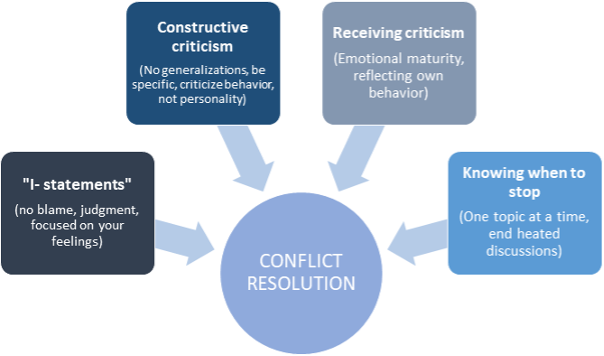|
Culture significantly influences the way we think about topics like money, work, gender roles or child-raising. Our partners different way of thinking about these topics might cause frustration and conflict, especially in intercultural relationships, where the differences might be quite severe. Many people believe that conflicts are a normal part of life and that we either need to avoid them or deal with them at any cost. They are often seen as a win-or-lose situation, even though there are ways to deal with conflicts in a friendly way that respects individual and cultural differences of the partner. Preventing conflict and dealing with it requires skills and practice.
Here are some tips how to handle conflicts in a mature and constructive way: 1. “I-statements” Imagine the following scenario: Noah comes home from a long day at work. Amy has been home all day with the three children and is exhausted, in desperate need of a break. Noah eats dinner with the family, then walks to the living room and turns on the TV. Amy knows that the dishes need to be done, says in a frustrated tone in her voice: “You never help with the dishes! You always do what you want. You are so selfish and unfair!” By saying this, she is inviting him to become defensive and maybe shut down a further conversation. Most people react to blame and accusation in a defensive way. Instead of using “you-statements” that are criticising Noahs personality (“You are selfish”) she could focus on her feelings and needs instead. She could for example say: “Hey Noah, I see that you are watching TV now. I am exhausted from the day and frustrated because I need to clean the kitchen by myself. Can you please help me?” This example is not focused on Noah and what he is doing “wrong”, but rather on Amy and her needs. Notice how this example also follows the steps of nonviolent communication explained in a previous chapter. 2. How to criticise When we are addressing a problem, we need to avoid making generalisations about our partner. In Amy's first reaction, the words “Never” and “always” are most likely exaggerated and can easily make Noah defensive. As already mentioned, criticising the behaviour of the person instead of the character is crucial. We can love and appreciate our partner the way they are, while still disapproving certain things they do and communicate these. Constructive criticism is supposed to help the partner learn and improve and not attack them and make them feel down. Try to ask yourself “what is the point here”?, then try to communicate that point clearly and directly. Do not expect the partner to know what you want from them. Sometimes even the obvious things need to be said. 3. How to take criticism When we are criticised, it is often very hard not to get defensive. We get triggered or emotionally react to an underlining issue, e.g. lack of self confidence or experiences from the past. Taking criticism requires emotional maturity that not everyone naturally possesses. You will continue to suffer if you have an emotional reaction to everything that is said to you. True power is sitting back and observing everything with logic. If words control you that means that everyone else can control you.” 4. Know when to stop
If we want to have constructive discussions with our partner, we need to stick to one topic at a time. Unhappy couples often find themselves dragging every possible issue into one conversation, which leads to both partners being frustrated in the end. Amy starts her conversation by wanting Noah to help with the dishes. The problem is that Amy also needs more help and support with the children. Furthermore, she does not feel seen in everything she does, she craves appreciation and understanding. These are all valid reasons to start a discussion, but the more complaints are raised in a conversation, the less likely it is that any of these will get fully resolved. When you have a lot on your mind, pick one thing. Discuss that thing. If a heated discussion develops, you might not even be able to properly finish that discussion. End it anyways. Resolve later when both have calmed down. Give yourself and your partner a break before you move on to the next topic. To sum up, conflict resolution is possible when awareness of our own behavior in conflicts is practiced. It is important to see where we can improve.
EXERCISE: Constructive criticism
a) Read the following statements containing destructive criticism.
1. I hate that you never really listen to me. You probably don’t even care. 2. You are always interrupting me. You really need to stop doing that. 3. You are so slow. We need to hurry to make it in time to our appointment. 4. You ‘forgot’ what? How could you forget to pay that bill! 5. No need to overreact. What on earth is wrong with you? b) On a piece of paper, formulate each sentence into a more constructive one, using the techniques discussed in the chapter. final thoughtsNow, after we have covered these six topics on intercultural communication, we hope you have a better understanding of communication theories, as well as methods and skills on how to communicate better with your partner.
If you still wish to learn more on the topic of Intercultural Communication, please check out our suggestions in the "Further Learning" section on the Welcome Page. Also, you can make use of the in-text references when searching for a particular subject or point of interest. Keep in mind, that only practice makes perfect and that awareness of challenges in communication is already the first step towards improvement.
|
QUICK LINKS TO THE COURSE THEMES
FURTHER LEARNING:
Take a look at some videos on conflict resolution and constructive criticism. How will these tools help you improve your communication and build a better relationship?
|
|
|
© Familia 2024



